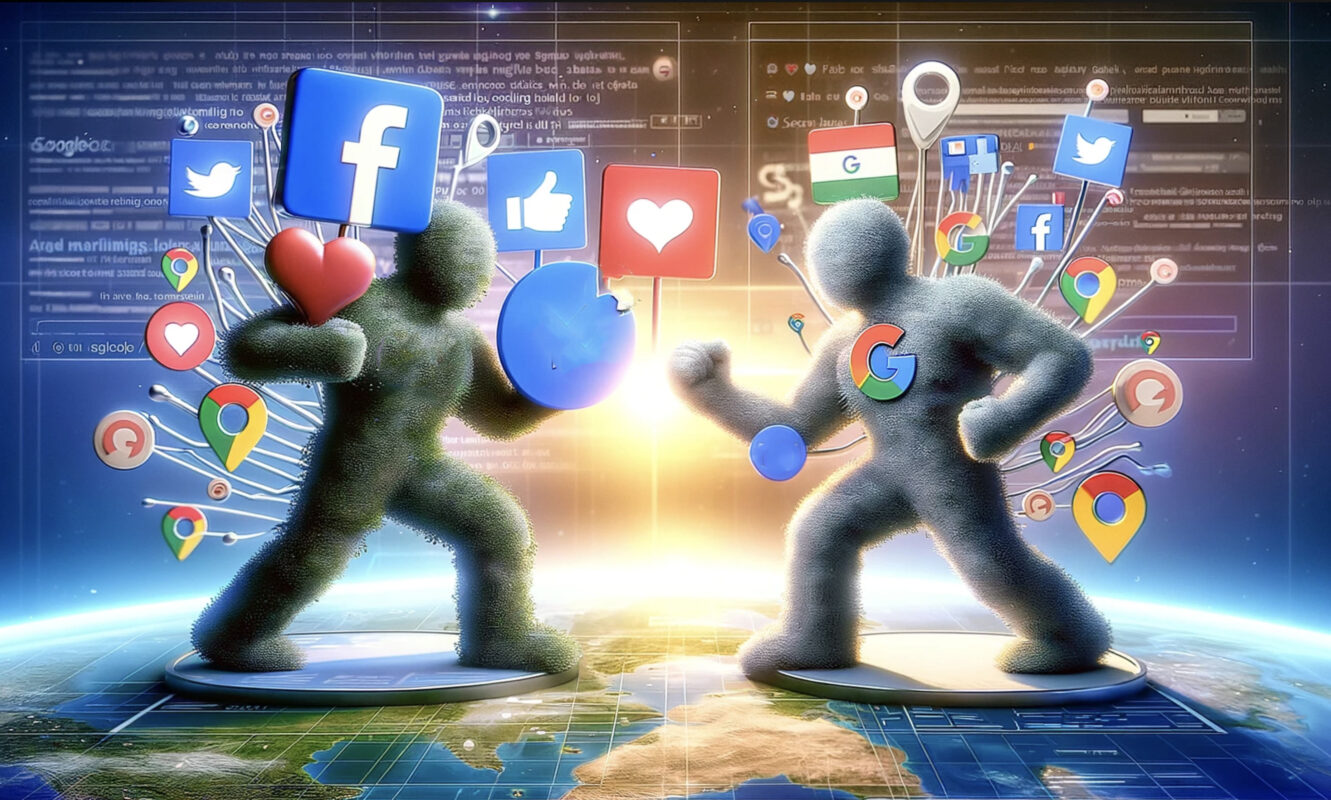Today, we’re diving into an epic showdown in the online advertising arena: Facebook Ads versus Google Ads.
Both are powerhouses in their own right, but how do they stack up against each other? Let’s unravel this mystery and see how you can make them work wonders for your business.
Understanding the Contenders:
- Facebook Ads: Imagine walking into a party where you know everyone’s likes, dislikes, and hobbies. That’s Facebook Ads for you – a master at targeting based on detailed user profiles and interests. It’s like having a conversation with your audience in their living room.
- Google Ads: Now, think of someone who can read minds – knowing exactly what you need, even before you do. Google Ads does just that by showing up at the precise moment someone searches for what you offer. Talk about being at the right place at the right time!
The key methods to target these channels are: In Facebook advertising, you are interrupting someone scrolling on social media. While with Google the person has intentionally searched for a specific word or phrase.

Differences That Make Them Unique:
- Targeting Techniques:
- Facebook Ads are the social butterflies, mingling based on shared interests and behaviors.
- Google Ads are the ‘straight to business’ types, focusing on what you’re actively searching for.
- Ad Formats and Their Charm:
- Facebook Ads are the creative geniuses, offering a variety of visually engaging formats.
- Google Ads are the minimalist artists, primarily text-based but also dabbling in shopping and display ads.
- The Game of Intent vs. Awareness:
- Facebook is your brand’s storyteller, building awareness and nurturing relationships in a casual setting.
- Google is the deal-closer, capturing those ready-to-act moments with precision.
- Cost Per Click
- Facebook ads will get you more clicks, for less money. This is because of the intent of people who you advertise to, they are not specifically looking for your product / service. So they have low intent / low likelihood of buying from your advert.
- Google ads will cost more per click (most likely). The people that are targeted will have a better likelyhood of buying from you. For example, advertise to someone who is searching for “Kitchen Cooker Review” or {Insert brand name} near me.
- Cost Per Click Does’nt matter
- Cost per click is a good metric to watch and understand. It should not be the driving force to whether you continue your ad campaign or not. Your goal is to find the “Cost Per Purchase” or the CPA (Cost per acquisition). This will let you better understand your return on investment.
Strategies for Winning the Game:
- Combining Forces: Why choose one when you can have the best of both worlds? Use Facebook to build your brand’s narrative and Google to seal the deal when customers are ready to act.
- Smart Budgeting: Align your spending with your goals. More immediate sales? Lean towards Google. Building a long-term brand love story? Facebook’s your go-to.
- Never Stop Experimenting: The digital world is your playground. Mix and match ad formats, targeting options, and messages to discover what makes your audience tick.
Big Data
Facebook ads and Google ads have gotten extremely smart. They have both advanced a lot over the past years. When advertising, you need to be aware on using Google ads & Facebooks ads big data to get better results. For example – they both allow you to create “lookalike campaigns”. This means that they will use your existing data (ie. website visitors or database) to expand it and to search for many more people who match your existing data profile.
Track Conversions
The first think you need to do is to make sure you are tracking conversions with a pixel. This is the most important step with any ad campaign. If you are not telling Google and Facebook what ACTION you want people to take (ie. see book a demo thank-you page), then your ad campaign will not perform as good as you expect it to.
You can check if your website has a Google Pixel by using this free Chrome extension.
Check if your website has a Facebook Pixel by using this free Chrome extension.
Poor Customer Support
Both Facebook ads and Google ads have a bad reputation for having bad customer support. Search Engine Land reports a significant decline in Google Ads customer service quality, with marketers experiencing issues like incorrect suspensions and aggressive sales calls, while Google plans AI-driven improvements. That is where digital marketing agencies and marketing consultants can help your business grow online. Glassfull Media and other digital marketing agencies specialise in digital marketing, learning about trends and tactics. Get in touch with Glassfull Media to discuss how our team can work to grow your business online.
Conclusion: In the grand scheme of digital marketing, Facebook Ads and Google Ads aren’t rivals; they’re partners in crime. By understanding and leveraging their unique strengths, you can create a marketing strategy that’s not just effective, but downright brilliant. While Google ads teams and Facebook ads team might sound like they are there to help you succeed online – in practice – they spend time pushing you to increase your monthly ad budget, because they have sales targets to hit. The knowledge by these companies is worse than in previous years, so make sure you have a 3rd party expert there to help your business grow.
